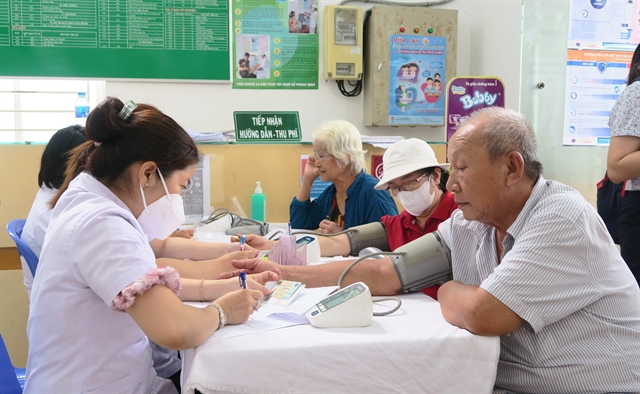 Society
Society

 |
| Senior citizens get check-ups at a health station in HCM City’s District 8. —VNA/VNS Photo |
HCM CITY — The incidence of non-communicable diseases affecting seniors has been rising in Việt Nam, making it a pressing health issue, according to health experts.
Many suffer from chronic diseases such as hypertension, diabetes, coronary artery disease, osteoarthritis, and cancer.
Besides, there are the other problems that affect the elderly such as cognitive decline, depression, and memory impairment.
The average life expectancy is more than 73.6 years, but the number of healthy years is only 65.4 years old, according to statistics from the Ministry of Health.
Although the life expectancy of Vietnamese people has increased, their health condition declines with age, Assoc. Prof. Dr. Nguyễn Văn Tân, head of the geriatrics department at the HCM City University of Medicine and Pharmacy, said.
People with one to two diseases make up 75.5 per cent of the total elderly population, while those with three or more have increased slightly to 1.34 per cent, he said.
The disease model in the elderly has shifted from infectious diseases to non-communicable chronic diseases such as cardiovascular diseases, diabetes and mental disorders, he said.
The healthcare costs for this demographic are seven to eight times higher than for children, creating a big financial burden, especially on poor households and those in remote areas.
Phạm Chánh Trung, director of the population division at the city Department of Health, said each elderly person suffers from more than two non-communicable diseases that require lifelong treatment.
These impact their mental well-being and daily activities, he said.
Their access to counselling and health care services is still limited, and the healthcare system has not kept pace with the rapidly ageing population, he said.
The quality of elderly care remains low and funding for organising healthcare activities for elderly people living by themselves is inadequate, he added.
Assoc. Prof. Dr. Đỗ Kim Quế, deputy director of Thống Nhất Hospital, said the main reason for the rising incidence of non-communicable diseases among seniors is the longer life expectancy these days.
Unhealthy eating habits, poor nutrition, contaminated food, and fast foods also contribute, he said.
Modern lifestyles play a role as people are becoming less physically active while prolonged stress and anxiety tend to promote these health issues, he said.
Early detection and timely treatment are key to managing non-communicable diseases, he added.
Analysts expect the healthcare sector to strengthen the capacity of its grassroots system to provide primary healthcare services, disease prevention and elderly care based on priority, convenience, availability, and accessibility, before gradually building a model of long-term healthcare for seniors.
It is essential to have comprehensive annual health check-up programmes, maintain electronic health records for all elderly people and develop a health database to analyse disease patterns among ageing people, they added.
A report released by the Pasteur Institute in HCM City said more than three million people in the southern region were found to have hypertension in the first four months of 2025, of whom more than 1.4 million are being managed and treated.
The number diagnosed with diabetes during the period was more than 1.2 million, and 656,000 are being managed or treated.
Non-communicable diseases have four main classifications: cardiovascular diseases (including stroke, myocardial infarction, hypertension), cancer, chronic respiratory diseases, and diabetes.
In Việt Nam, cardiovascular diseases, chronic respiratory diseases, cancer, and diabetes are the cause of nearly 80 per cent of deaths. —VNS




